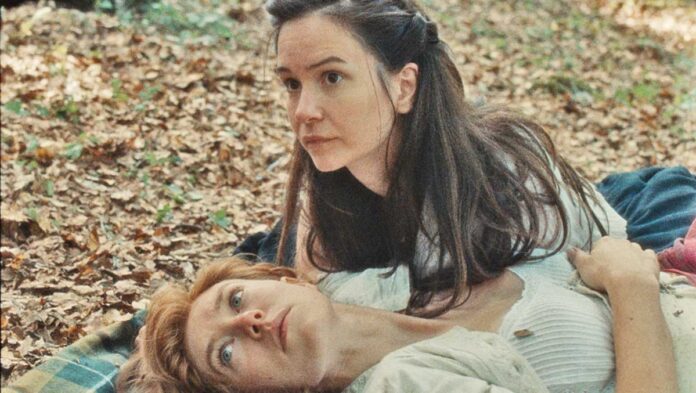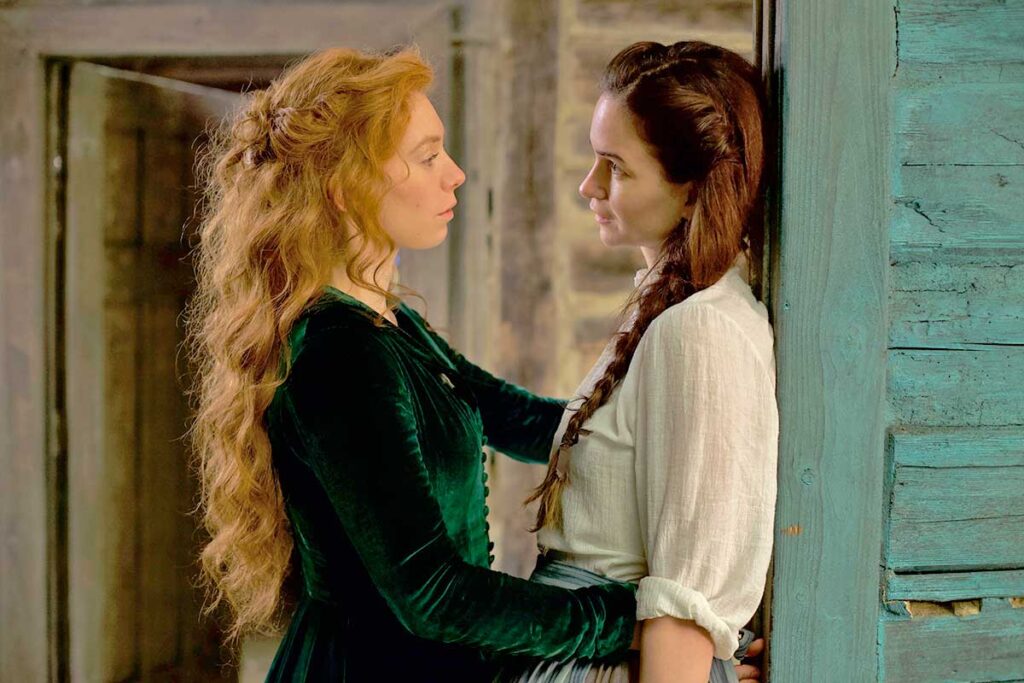
The beguiling lesbian drama, “The World to Come,” out March 2 on demand, opens on a cold and bleak New Year’s Day. It is 1856 and Abigail (Katherine Waterston) writes in her diary, “I have become my grief.” She is mourning the recent loss of her daughter to diphtheria and eking out an unhappy life with her husband Dyer (Casey Affleck) on an upstate New York farm. (The film was actually shot in Romania). She hopes to buy an atlas to self-educate and stave off the boredom that overwhelms her.
Abigail’s dull life changes, however, when she meets her new neighbor Tallie (Vanessa Kirby), the wife of Finney (Christopher Abbott). When Tallie visits one afternoon, Abigail admires her neighbor’s skin and is bewitched watching Tallie fuss with her sleeve or her hair. “Meeting you has made my day,” she tells her new friend, which charms Tallie.
“The Word to Come,” directed by Mona Fastvold, and adapted from a Jim Shepard story (by the author and Ron Hansen), chronicles how these two oppressed women find a measure of happiness together. “Her spirits seem to quicken at the prospect of further conversation with me,” Abigail correctly observes in her diary. As the two women continue to meet, they become more intimate, silently testing the waters of their forbidden attraction. Viewers will feel a spark of electricity between them.
Both women, however, are expected to perform wifely duties. Abigail takes care of her husband, but she is reluctant to try to have another child. It may be that the emotions Tallie has awakened in Abigail have contributed to that decision. In contrast, Finney is wary, recording all of Tallie’s visits to Abigail, and he is determined for her to become pregnant.

“The World to Come” is leisurely paced, but it is rich with period details, providing a strong sense of time and place. Abigail’s diary entries, which propel the narrative, are compelling. As she recounts her life and records her emotions — “There is something going on between us that I cannot unravel,” she writes about Tallie — it is easy to get caught up in her secret romance.
The film generates most of its interest in the tender scenes between the two women. Abigail offers to warm Tallie’s feet one day when she arrives during a snowstorm. And when the women later give in to their pent up desires and kiss each other hungrily, Fastvold depicts an ecstatic moment of Abigail experiencing “astonishment and joy.” Even better is a scene where the women talk about their relationship. Abigail likens it to being “imprisoned in a positive way,” suggesting the boundaries they must adhere to in order to maintain their discrete romance. Tallie, however, asserts that she never liked living in cages, injecting some first-wave feminism into their conversation. The relationship empowers both women, albeit in different ways, giving them imagination, courage, and agency, however limited.
Fastvold emphasizes the social constraints these women must endure and, while “The World to Come” does feel stifling at times, that is to the film’s credit. When Dyer catches Abigail in a lie, he suspects something is going on between his wife and Tallie. But his response is not nearly as severe as Finney’s concerns that Tallie is acting inappropriately. (Thankfully viewers are left to determine for themselves if Tallie has had prior indiscretions.)
Of course, the film builds its dramatic tension on the affair being discovered, but there is also a hope that the love between these women can survive in a society as harsh as the farmland. Things become difficult when the couples meet for dinner one June evening and Tallie acts distant. Abigail later writes that her heart “is a maelstrom,” indicating her concern for their relationship.
The actresses are lovely together, and both give excellent performances. Waterston is luminous as Abigail. Watch how her countenance changes whenever Tallie arrives at Abigail’s door — she just glows with obvious attraction. It shows the profound impact this relationship has on her. (Dyer acknowledges that the smile she greets him with at the door one day probably wasn’t for him). As Tallie, Kirby displays a confidence — she often speaks with conviction — but also exudes an air of mystery about her that is attractive. The tender scenes of the women kissing and caressing each other in bed flash briefly across the screen, but they suggest the depth of the women’s passions.
In support, Casey Affleck (who also produced the film) does his typical low-key mumbling, but it is oddly suitable. His Dyer is a man who seems to accept that he is trapped in his circumstance, and copes accordingly. However, Fastvold makes a canny decision to have Christopher Abbott, rather than some hulking brute, play Finney. While the actor is (perhaps deliberately) stiff at first, he eventually becomes quite sinister as the villain of the piece.
“The World to Come” may be a bit gloomy, but the romance it depicts is stirring.